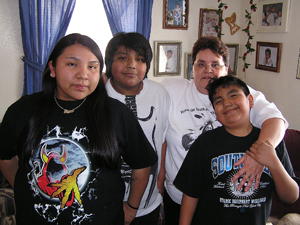 The rate of fetal alcohol syndrome among Indian children is 30 times higher than whites but tribes in Minnesota say not enough is being done to address the problem.
Sandra Parsons, the director of Family and Children's Services for the Red Lake Nation, said FAS is pervasive on reservations. "I haven't found anybody yet who disputes that. I think people would be literally amazed at how prevalent it might be," she tells Minnesota Public Radio.
Sue Antone, a Red Lake tribal member, has first-hand experience. The three children she adopted
suffer from FAS and FAS symptoms because their mother drank heavily during her pregnancies.
"Every time I try to do something to try to get somebody to help me with fetal alcohol, another door slams," she says.
Anita Fineday, a judge for the White Earth Band of Ojibwe, blames family dysfunction on FAS. "My guess is that 90 percent of those cases include a parent or a grandparent who has fetal alcohol effects or syndrome, and I think the children, as well," she says.
Pat Moran, a White Earth tribal member, quit drinking in 1985. But it wasn't soon enough to protect her daughter, who was diagnosed with FAS after having difficulties in school.
"Many years I denied the fact that my family or anyone else was hurt by my using," Moran says.
Get the Story:
The rate of fetal alcohol syndrome among Indian children is 30 times higher than whites but tribes in Minnesota say not enough is being done to address the problem.
Sandra Parsons, the director of Family and Children's Services for the Red Lake Nation, said FAS is pervasive on reservations. "I haven't found anybody yet who disputes that. I think people would be literally amazed at how prevalent it might be," she tells Minnesota Public Radio.
Sue Antone, a Red Lake tribal member, has first-hand experience. The three children she adopted
suffer from FAS and FAS symptoms because their mother drank heavily during her pregnancies.
"Every time I try to do something to try to get somebody to help me with fetal alcohol, another door slams," she says.
Anita Fineday, a judge for the White Earth Band of Ojibwe, blames family dysfunction on FAS. "My guess is that 90 percent of those cases include a parent or a grandparent who has fetal alcohol effects or syndrome, and I think the children, as well," she says.
Pat Moran, a White Earth tribal member, quit drinking in 1985. But it wasn't soon enough to protect her daughter, who was diagnosed with FAS after having difficulties in school.
"Many years I denied the fact that my family or anyone else was hurt by my using," Moran says.
Get the Story:Alcohol exposure affects generations on Indian reservations (Minnesota Public Radio 10/22)
